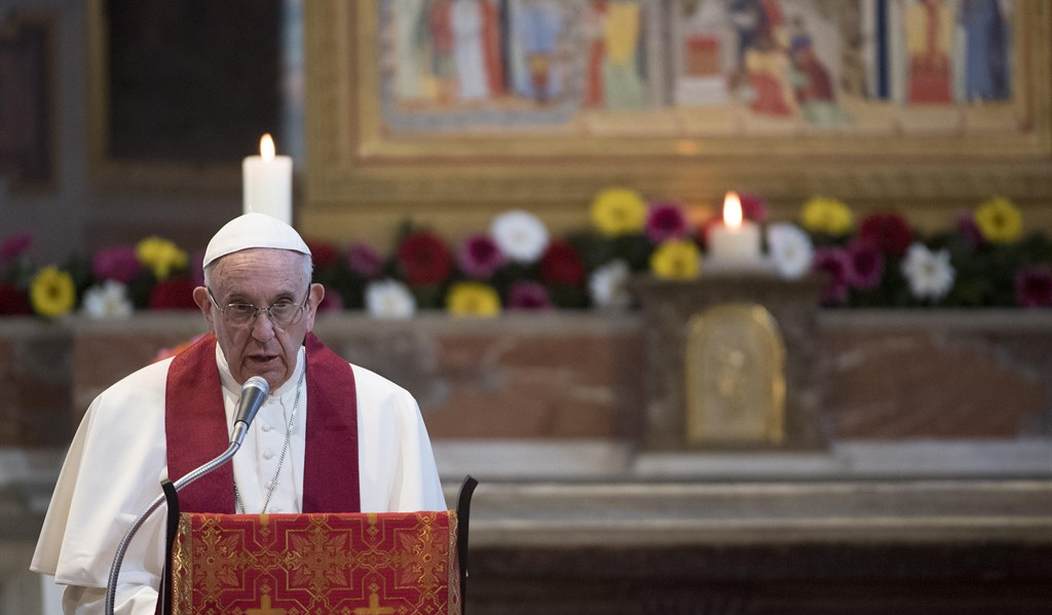Tomorrow, Pope Francis will arrive in Egypt on a trip planned well before ISIS attacks on Coptic Christian churches on Palm Sunday, but the attacks have clearly changed the perception of the pontiff’s mission. Veteran Vatican reporter Francis X. Rocca reports on pressure inside Egypt as well as outside for Francis to challenge the Egyptian government and Muslim establishment to reform its interpretations of Islam. However, the Vatican sees this as a more delicate mission, and it may be more of a question of the appropriate time and place for such a challenge:
The pope has earned approval in the Muslim world for his attempts to improve relations. He has washed the feet of Muslims during Holy Week ceremonies and, when he brought a dozen Syrians back with him from a Greek refugee center last year, all were Muslims. He condemned the 2015 massacre in Paris of the staff of Charlie Hebdo after it mocked the Prophet Muhammad, but also said those who deride other faiths can expect a strong response.
Yet some Catholics also want the pope to challenge Muslims more vigorously to repudiate religiously inspired violence and intolerance, amid continuing Islamist terrorism and persecution of Christians in some Muslim-majority countries—including church bombings in Egypt on Palm Sunday that killed more than 40 people.
The pope should call on Muslim leaders “to reinterpret the Koran for today in a way that fosters peace,” said the Rev. Samir Khalil Samir, an Egyptian Catholic priest and professor at the Pontifical Oriental Institute in Rome, who said he raised the subject with Pope Francis last June.
The Vatican spokesman, Greg Burke, said that the “pope is constantly condemning those who kill in God’s name. What he doesn’t want to do is encourage a clash of civilizations.”
Some critics would respond by arguing it doesn’t need much encouragement, but rather an acknowledgment. That’s especially true of Christians in the Middle East, Rocca points out, who have watched with some alarm the inter-religious efforts of pontiffs over the last 30 years to Islam, which has largely produced little change in their doctrinal direction. Pope Benedict offered a more publicly critical view of Islam in a 2006 speech in Germany, which resulted in protests and a disruption of those outreach efforts, but also a new dialogue with some Islamic scholars that resulted in a broad condemnation of religious violence. That didn’t produce any overall change in direction, though. Meanwhile, Christians in the Middle East have lived through a clash of civilizations in Iraq and Syria, and have come out on the losing end, along with the Yazidis and others who have suffered a genocide in the ancient province of Nineveh.
On the other hand, Egypt might not be the best place to channel Benedict XVI either. For one thing, Egypt’s president has been alone among leaders of Muslim nations in demanding doctrinal reform in Islam already. A little over two years ago, Abdel Fattah al-Sisi spoke at a gathering of clerics in the nation and demanded a “religious revolution” to parallel Christianity’s Enlightenment. That would certainly benefit Sisi himself, by making Islam a purely spiritual force in Egypt, but also put Egypt on a more modern path that can better engage the world.
So far, Sisi has not translated this call into better security for Copts, as the Palm Sunday bombings demonstrated, but he has been a voice for reform at a time when it’s dangerous for reformers. Having Pope Francis use his visit as a platform to criticize Islam in general won’t help Sisi, and could likely make him a bigger target. When Francis speaks at Al-Azhar University on Friday, he’s more likely to condemn religious violence in general rather than lecture on the need for doctrinal reform, both for the purpose of engaging the audience rather than antagonizing them, and to provide an opening for native voices in Egypt to take up that cause without having them painted as stooges for “crusaders” — or at least more than usual.
Anything stronger than that message would likely be offered in a more deliberate fashion while at the Vatican, as part of an encyclical or personal message, if at all. In fact, we can probably expect Pope Francis to deliver the same message he offered in his recent TED talk — that we are all connected, and we need everyone to work together to thrive. Perhaps in that, he’ll offer a few seeds of an Enlightenment message:
“Tenderness means to use our eyes to see the other, our ears to hear the other, to listen to the children, the poor, those who are afraid of the future,” Francis said in his TED talk. “To listen also to the silent cry of our common home, of our sick and polluted Earth. Tenderness means to use our hands and our heart to comfort the other, to take care of those in need.”
Tenderness isn’t for the weak, the Pope continued. It takes spiritual and emotional strength to empathize and act on behalf of the neediest. And the alternative, arrogant and out-of-touch leaders, are like fall-down drunks who ruin the party for everyone.
“Please, allow me to say it loud and clear: the more powerful you are, the more your actions will have an impact on people, the more responsible you are to act humbly. If you don’t, your power will ruin you, and you will ruin the other.”
That message might be more appropriate in Egypt, but Francis has a way of surprising people.
Update: I originally used the word “ecumenical,” but the proper term is “inter-religious.” I’ve changed it above. Thanks to Ray D for the correction.








Join the conversation as a VIP Member